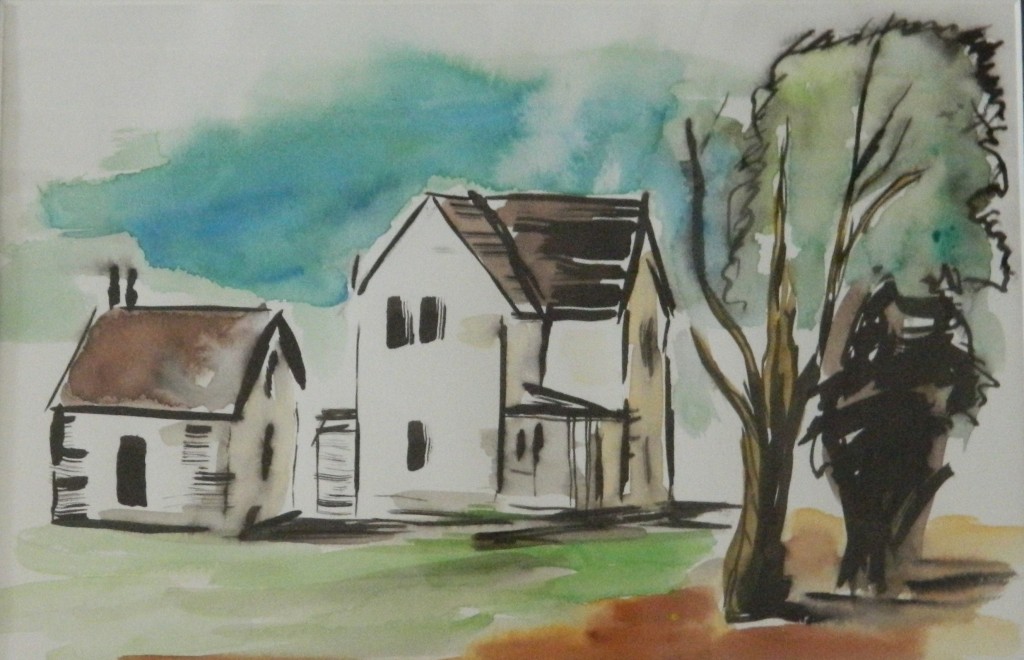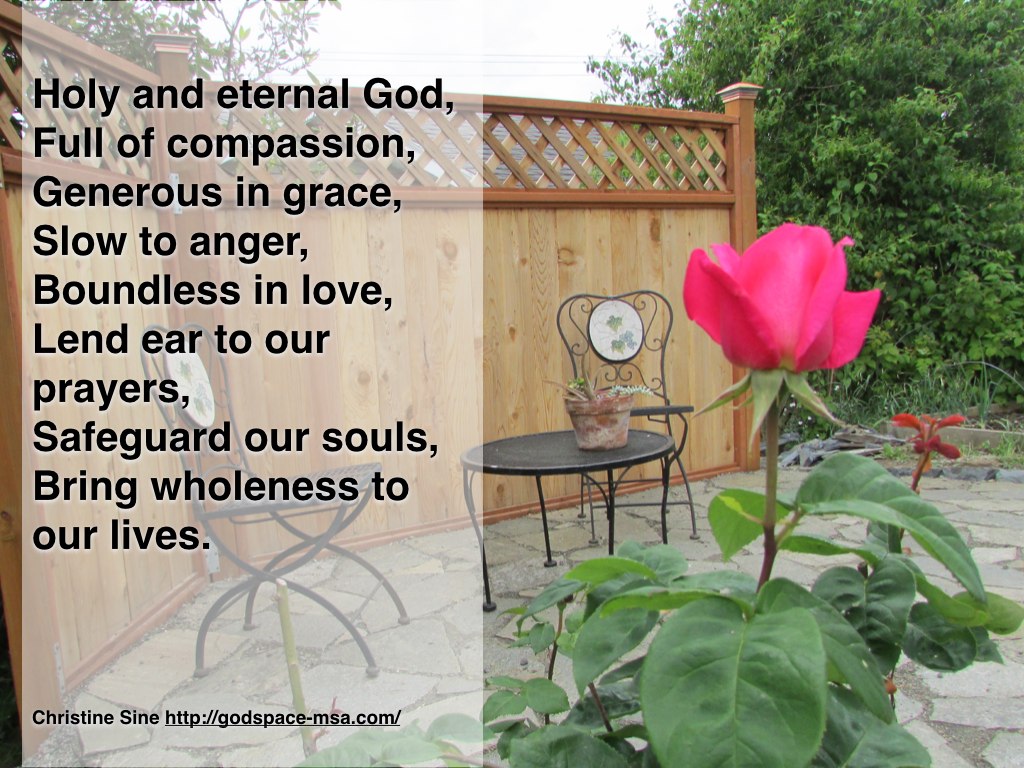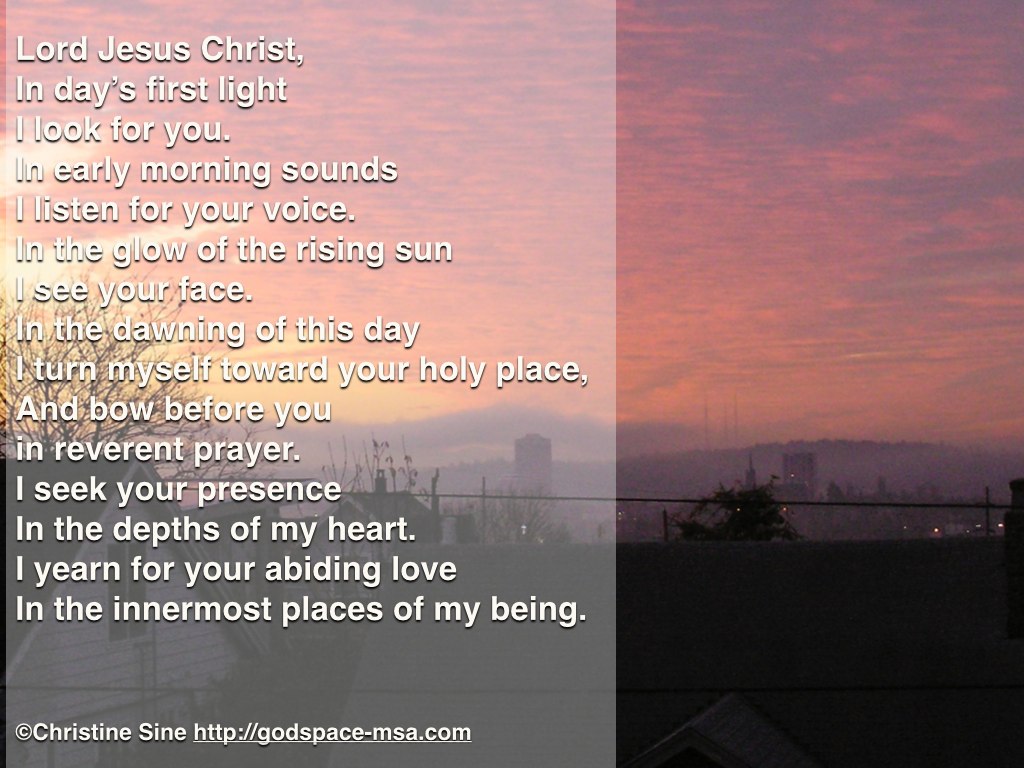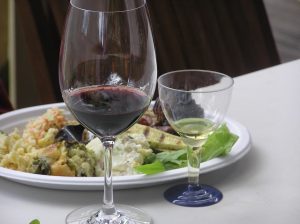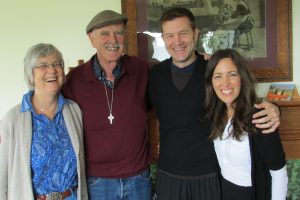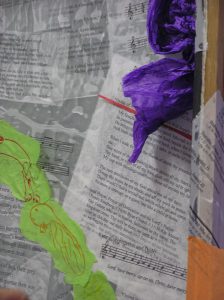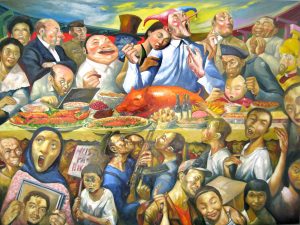Will you open your home and heart?
Hospitality is one of those sometimes messy Christian practices. When we welcome people into our lives, the smells from bodily functions might hang around in the air. Muddy footprints might mar our floors. We might drop our masks, revealing times of irritation or stress.
But we’re saying come, we welcome you. We want to provide you a haven of rest; a place to close the room to your door when you need to; a space to converse and share. But we’re saying come, we welcome you. We want to provide you a haven of rest; a place to close the room to your door when you need to; a space to converse and share.
My husband and I are not perfect hosts by any means, but throughout our ten years in our vicarage, we’ve tried to be open and say yes when asked. It’s only in the last year or so that we have not had either a family member or an au pair living with us; that was a particular season of sharing and molding and learning. This summer seems a unique time of welcoming traveling Americans – every weekend, a new set, each with their own gifts and riches.
A few practical tips:
- Create a guide to your house. I got this idea from a throwaway line in Packing Light, a wonderful memoir about a woman who travels around the 50 states. In our guide we tell our guests about things like the wonky shower curtain (yes, it will fall on you if you’re not careful) and give them the wifi code. This also can be a repository of tourist information (especially if you live in a world-class city like London).
- Have in mind a few go-to meals. Our crock pot (slow cooker) has transformed our cooking, helping us to make easy and healthy meals. Cooking a whole chicken, for example, is now painless.
- Treasure your guest book. Our only requirement when people come to stay with us is that they sign our guest book. We love looking back over the entries, which evoke memories of the gourmet meal cooked for us by one or the Pimms we shared with another.
- Remember that they’ve come to see you (or your city), and that your house doesn’t have to be perfect. Having been raised in a very tidy home, I find this a struggle. But the visitors this summer will see by our various clutter-spots my “progress” in being able to welcome people even when there is some mess.
What tips would you add?
Washing machines at the ready, here we go!
——————————————-
This post is contributed by Amy Boucher Pye for the series Hospitality – Opening Doorways To The Kingdom
Amy Boucher Pye is an American who has lived in London for a decade and a half, after marrying her English vicar. She’s a writer, speaker and editor. She blogs at www.amyboucherpye.com and tweets at @AmyBoucherPye.”
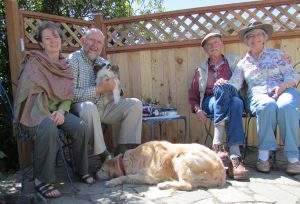
With Tom and Kim Balke (and Bonnie) in our new sacred space
As I mentioned in Friday’s post Cooking is not a Spectator Sport, we have had a steady stream of visitors over the last few weeks, with more to come as the summer progresses. Some guests, like Tom and Kim Balke who drove down from Canada on Saturday especially to spend the day with us are close friends of long standing. Others like Matt Chapman and the Nieu community members are new acquaintances.
As we entertain and enjoy fun, food and fellowship together, I am very aware that in some ways all of us are guests, guests of God and of God’s world, generously and lavishly experiencing the hospitality of a world that is itself a gift from God. I am aware of that as I pick raspberries in the early morning, enjoying the abundance of God’s provision. I am aware of it too as I gaze on the beauty around me and breathe in the fragrance of God’s presence.
Celtic saints, who saw themselves as hospites mundi, or guests of the world, living lightly on this earth and not becoming attached to possessions or to one location. These followers of Christ, saw all of life as a pilgrimage, a journey towards God. They believed that we live in perpetual exile, constantly seeking after Christ, and our outward journeys are to reflect our inner transformation. In exiling themselves from the comforts of home, pilgrims taught themselves to rely only on God.
The Celts had a saying for those setting out on pilgrimage: “Let your feet follow your heart until you find your place of resurrection.” This was a spot where God’s will for a pilgrim would be revealed and fulfilled. The place of resurrection need not be a famous holy site or a place far away. It could be a simple stone hut, a windswept island, or a secluded valley. The important thing was that each person needed to find their own site.
Recognizing ourselves as guests and pilgrims effects how we view everything that happens to us. Pilgrims and those who travel frequently do not take anything for granted. They learn to be grateful for comforts that those who never leave home take for granted. For a guest, each meal, especially a home cooked meal, is a gift of love from the host. Each bed provided for us to sleep in is a generous act of sharing and caring. Everything is now a gift of God.
So as you go out into the world think of yourself today as a guest of the world and prepare yourself for the amazing gifts God wants to lavish on you today – gifts of friendship, and food. Gifts of fellowship and love and caring. And let me know what new things open up for you as a result.
This week I have spent a great deal of time contemplating the beauty of creation and the wonder of God’s presence with us. The following two prayers have come from that contemplation. They were first posted on the Light for the Journey Facebook page.
This morning Tom and I are getting ready to host a group of people from Nieu community here in Seattle. It is one of those activities we delight in. I have already been outside harvesting lettuce, returning to the house with the fragrance of mint and arugula clinging to my clothes. (Part of the reason I am posting this so late today). Tom has the main dish ready – a wonderful Mexican rice and beans dish that is one of my favourites. This afternoon I will make sangria, and fruit salad while Tom makes his delicious guacamole salad.
Tomorrow we have more guests in town. Good friends Tom and Kim Balke are driving down from Canada just to spend the day with us. They will arrive early with blackberry apple crumble for us all to start the day. Then for dinner we will have our favourite roast lamb dinner with roasted vegetables and garden salad.How special such friendships and the hospitality they engender, are for us. And the delight of preparing the meal together is part of the enjoyment, and part of where our friendship is deepened.
This is the end of a week of wonderful rich fellowship with an array of friends. On Wednesday Steve and Michelle Ruetschle were with us. Special friends who work in the Philippines. Some of you may remember Steve who suffered a tragic accident several years ago which should have left him quadriplegic, unable to walk. To watch him walk up our front steps and eat at our table each time he and Michelle come to visit brings tears to my eyes. Monday Coe and Janet Hutchison former MSA Board chair, who now live in Port Townsend were with us, another delightful and special time.
In the midst of these activities words that I read in Food and Faith this morning keep revolving in my mind. Wirzba talks about how we have taken cooking which is one of the fundamental activities that define people as human beings, and made it into a spectator sport. Cooking and eating have become spectacles that make it very hard to experience food as a precious gift that is God’s delight.
People who watch an array of cooking shows each week, don’t have time to cook. And the shows are designed to entertain to to teach cooking. “They are targeted at people who love to eat rather than people who love to cook. (191). Not surprisingly, as Michael Pollan shares, studies show obesity rates are inversely correlated to the amount of cooking people do at home.
It all makes me wonder if we can really offer hospitality without home cooking. To rediscover the art of hospitality maybe we need to rediscover the joy of cooking too. What do you think?
I am currently working on the program for our annual Celtic retreat. Feeling a little drained out after a hectic season of meetings and hospitality though so I am not really able to concentrate. It is at times like this that I most appreciate the resources that others have put together so I thought that you too might appreciate this list of sites I have found with good litanies, prayers and liturgical resources. I apologize however for the fact that they are not listed in any particular order. Since I suspect some of you may like to repost this I have added my own website to the list.
- The Text This Week
- Liturgy – Worship that Works
- Sacredise
- The Work of the People
- Godspace
- Laughing Bird Liturgical Resources
- ChurchNext.TV
- Call to Worship
- The Worship Well
- Evensong
- WorshipHouse Media
- Reformed Worship
- Christian Classics Ethereal Hymnody
- Long and Winding Road
- Leading in Worship
- Igniter Media
- The Billabong
- Starters for Sunday
- His Company
- Lectionary Liturgies
- Sermon Spice
- Friends of Art
- Nailscars
- Hope Publishing Online Hymnody
- sustain:if:able kiwi
- RESOUNDWorship.org
- The Jubilate Group
- Engage Worship
- Rev-o-lution
- Mennonite Church Canada Resource Centre
- Bible Gateway
- spirited & singing
- Wellsprings
- LiturgyLink
- Jonny Baker Worship Tricks
- Experiential Worship
- Digital Orthodoxy
- RevGalBlogPals
- Liturgy Outside the Box
- Biblical Art on the www
- The Open Sourcebook
- Mustard Seeds
- United Methodist Church
- If you have others that you think should be added to the list please let me know
Hospitality is the act of the recklessly generous heart.
Sister Joan Chittister
What can you do if your circumstances, through illness for example, currently don’t allow you to meet with many people face to face, when being housebound means you do not meet the stranger, and when you yourself are at present reliant on the service of others for your basic needs of being fed and watered?
In order not to spend our lives constantly thinking of what we are not, cannot do, in order to follow the wonderful example of Mustard Seed House for example, we need to broaden our definitions of hospitality.
For me, hospitality begins with the need and desire to cultivate the spirit of openness amongst and for others; that same spirit which we have been given ourselves. A definition of openness? Being present with all that you are and that you have been given; paying full attention and focus to what or who is immediately before you, for as long as it or they need; and being prepared to give to that exchange whatever it costs, without hesitation, giving freely, as you have been given. It is creating a space where soul can meet soul.
Living a solitary life by choice, necessity or force means that in order to be prepared to be open to others whenever the occasional opportunity arises, it is even more important that we must first be hospitable to ourselves – all of our selves. ‘This human being is a guesthouse’ the poet Rumi says. Even though this might include ‘a joy, a depression, a meanness’ the result is that we can be visited by ‘some momentary awareness’. So we need to ‘treat each guest honourably’, being
grateful for whoever comes,
Because each has been sent
As a guide from beyond.
I am just beginning to recognise and welcome by name some of my inner ‘Kate’s’ who come waltzing by – most especially when they choose to visit when I am trying to be silent and meditate. Instead of shutting them out and shutting them up, and keeping them out by a sheer act of will power, I am learning to do the opposite. I welcome in ‘Kate the constant commentator’, ask her sit awhile and wait until I can give her my full attention. When ‘Kate the perfect planner’ shows up, I ask her in, to sit beside me, until I can give her desire to control the future my full attention. You get the idea.
My model for this is to attempt to show myself the same Grace I have been shown. Because I am slowly learning too that unless I am embarked on this journey of Love towards myself as part of my daily discipline, I have no chance of fulfilling God’s primary commandment for humanity:
Love The Lord your God with all your heart, mind, soul and strength and love your neighbour as you love yourself.
My self is rightly last in the queue. But unless I show equal compassion to myself, how do I have any understanding of how to show compassion to whatever neighbour shows up? If I do not allow Grace to do her work in me, how can my soul be an effective witness in each chance or planned event?; how may she show that the Kingdom transforms all who are introduced to it?
I repeatedly pray my heart will be opened to God, to others, to myself in order that ‘Thy will be done’ this day. So that the trickle of Grace will then find her way through every text, every email, every Facebook post, every encounter, by what ever means, I have this day. By this, I am learning to trust that God is at work in me, however ill or distant or distracted I may feel.
And if God is at work, then when I join in with this community’s prayer, along side the whole Church: ‘Your Kingdom come on earth as it is in Heaven’, then I am practising hospitality without even being aware of it.
That is Grace to the stranger indeed.
 Kate Kennington Steer is a writer and photographer with a deep abiding passion for contemplative photography and spirituality. She writes about these things on her shot at ten paces blog (http://shotattenpaces.blogspot.co.uk).
Kate Kennington Steer is a writer and photographer with a deep abiding passion for contemplative photography and spirituality. She writes about these things on her shot at ten paces blog (http://shotattenpaces.blogspot.co.uk).
Hospitality has always been important for Tom and I, which has led to some interesting encounters and the founding of some wonderful friendships.
Once, about five years ago we had two young men arrive at our front door. Mormons we thought at first, then realized they were too scruffily dressed.
“Can we tent camp in your backyard?” they asked. They needed a place to stay for a few nights and had come across the Mustard Seed House while looking for intentional communities in Seattle. We invited them in and learned that they had just spent a year at the Sojourners’ community in San Francisco after graduating from Lipscomb University in Nashville Tennessee. They wanted to join a community in Canada but the Canadians didn’t want them to cross the border.
“You can’t tent camp in our backyard but you can sleep in our basement apartment.” we told them. When tenants moved into the apartment a few weeks later they transferred to our prayer room where they slept on the floor. A few weeks became months and then a year. By now they we close friends. They helped around the house and garden, becoming a vital part of our community.
Our angels unaware we called them reminders of Paul’s words: Don’t forget to show hospitality to strangers, for some who have done this have entertained angels without realizing it! (Hebrews 13:2 NIV)
They arrived just as Tom was starting to repaint our living room, a job that he thought he could do alone in 4 days – it took Tom, our two new friends and another helper 4 days together to do the job. how easily we could have missed God’s provision for completing this task.
On another occasion we returned from a trip to Australia to find they had stripped and refinished our dining room table – a special 60th birthday blessing for me.
The previous year a family of friends arrived from England without a place to say. The husband was ill and could not hold down a job. They move into our hospitality room and ended up living there for a year. They too helped around the house and garden. Build a children’s fort in the backyard that fifteen years later is still a special place for kids to play.
“Doesn’t having strangers in the house bother you?” we are often asked. “Isn’t it risky?” “Have you ever been scared?”
These are the questions that all of us worry about when we open our homes and our lives to be hospitable to strangers. And of course we all need to be careful, listening to the prompting of the spirit, and to the advice of friends, trying to discern when to say yes and when to say no. Sometimes we do make mistakes, conflict happens. Sometimes it is more stressful than we expect and we close our doors for a season. Sometimes we have to ask people to leave. Establishing appropriate boundaries is sometimes a slow and painful learning experience, but in the process we learn a lot about ourselves and about what it means to be the people of God. Slowly we are transformed into the inclusive, loving community of God’s kingdom.
In Reaching Out, Henri Nouwen reminds us that: Hospitality means primarily the creation of free space where the stranger can enter and become a friend instead of an enemy. Hospitality is not to change people, but to offer them space where change can take place. And it is not just those we invite in who are changed. We are transformed too.
Ironically the hardest guest we have had live with us was Tom’s schizophrenic son Wes. He moved into our basement after spending several years on the streets, refused to take meds and slowly sank into depression. Asking him to leave was one of the hardest things we ever did. Yet it was the best for both him and for us. He now has a small place of his own and we have established the best relationship we have had in years.
Wes taught me a lot about the strange and sometimes challenging messengers that God seems to take delight in using. Ezekiel, Isaiah, Jeremiah, in fact all God’s prophets heard voices and saw visions that would quickly have them labelled as schizophrenic today. Francis of Assisi too would be given short shift in our society. He not only spoke to animals, he took off his clothes, and gave away his money.
Being hospitable is not always easy, and it is not always safe, but the benefits far outweigh the disadvantages and it is I believe a doorway to the kingdom. Take the risk and like us you might find that you are entertaining angels unawares.
————————–
This post is part of the series Hospitality – Opening Doorways to the Kingdom which will run until the end of August. If you would like to contribute a post please do not hesitate to contact me.
As an Amazon Associate, I receive a small amount for purchases made through appropriate links.
Thank you for supporting Godspace in this way.
When referencing or quoting Godspace Light, please be sure to include the Author (Christine Sine unless otherwise noted), the Title of the article or resource, the Source link where appropriate, and ©Godspacelight.com. Thank you!

